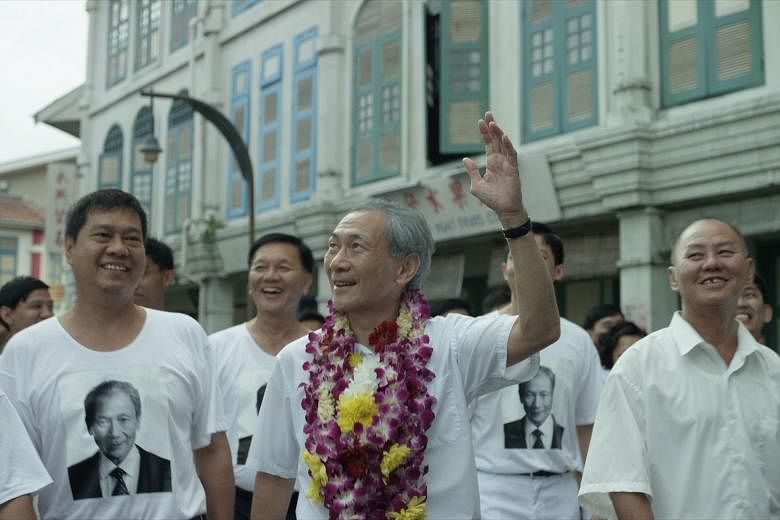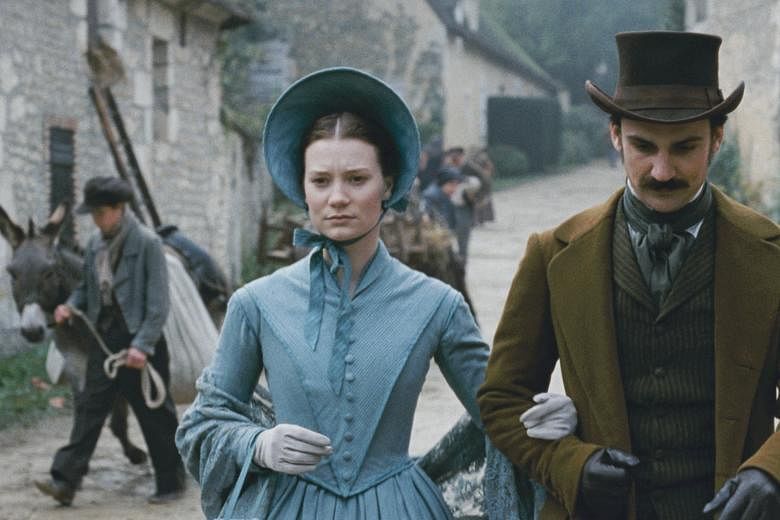In films marking Singapore's 50th anniversary, we have seen the sublime in the 7 Letters short film anthology. Now, for something else altogether.
The historical drama 1965 (PG13, 130 minutes, opens tomorrow, 1.5/5 stars) attempts to be a soul-stirring, flag-waving, sweeping epic of commemorative edutainment.
Most of all, it yearns to be taken seriously. It practically dares you to ignore the number of significant moments it strings together - here is veteran actor Lim Kay Tong doing an impression of the weeping Lee Kuan Yew, then come the race riots, now come songs played over a slow-motion montage of nation- building moments. It wants to be Important, with a capital I.
This grab at gravitas might be a bit more seemly, if only the fictionalised portions looked decent. But with a storytelling style riddled with the problems typical of checkbox-ticking works of art, the movie feels only slightly more relevant to the national birthday than a chicken bun with an SG50 sticker slapped on it.
The screenplay portrays ordinary people swept in the currents of mid-1960s history - except that history here not so much sweeps them away as drops them in an alternate universe in which people behave in ways that defy common sense.
A cop, Inspector Cheng (Qi Yuwu), is blamed by hawker Khatijah (Deanna Yusoff) for a tragedy. The hate sets off a chain of events marked by communal tensions, during which the pair's dynamics devolve into a series of back-and-forths that offer no insight or resolution.
The Cheng-Khatijah relationship is set up as a microcosm of troubled race relations, and screenwriters Andrew Ngin, Randy Ang and Daniel Yun (with Ang and Yun also doubling as co-directors) love exploiting the visuals of mass protests and street fights.
But making the effort to dig into the psychological roots of race hate? Not so much. They opt to wrap it up with a "don't be evil" message, as if it needed saying.
Lim's Prime Minister Lee speech scenes bear only a tenuous connection to the primary story. What value the re-enactments add is a mystery; just because it can be done does not mean it should.
Mike Kasem is inexplicably cast as Pakistani reporter Raj (because, presumably, every Indian actor in Singapore was busy). Serving mainly as Mr Political Explainer, he slouches moodily about town, musing about the goings-on in a world-weary tone, looking as if he wandered in from a different movie, perhaps a 1950s noir thrilller.
The opening narration by junior cop Adi (Sezairi Sezali) makes him sound like the film's protagonist, only for the script to demote him to secondary character, then bring him back at the end to tell the audience that they should all get along.
Just when one thinks it cannot get worse, with a screenplay rife with half-baked threads, extraordinary coincidences, overlong street riots and characters that spout either exposition or platitudes (sometimes both), along comes a cheesy whodunit thread that ends in a climax featuring a surprise villain.
In effect, the blame for communal strife is shifted to a scapegoat and everyone else walks away clean and heroic.
The 7 Letters anthology and 1965 stand in contrast: Both aim to be event movies, but could not be more different in approach or quality.
For political strife of the gender variety, there is Madame Bovary (rating to be advised, opens tomorrow, 2.5/5 stars), which fits the profile for contemporary awards-season period drama: sumptuous panoramas, a range of nice hats, a female protagonist with modern sensibilities.
Director and co-writer Sophia Barthes (Cold Souls, 2009) attempts to rehabilitate the character marked as fatally avaricious in Gustave Flaubert's 1856 novel.
"I want emotion, not discipline," declares Madam Bovary (Mia Wasikowska) early on.
In Barthe's vision, her flaw is not greed, but an over-developed sense of aesthetics.
Married to a dull country doctor (Henry Lloyd-Hughes), she has flings with young law clerk Leon (Ezra Miller) and the dastardly but handsome Marquis (Logan Marshall-Green). Rhys Ifans is deliciously sinister as trader Monsieur Lheureux, who sets her on the path to self-destruction.
Sympathy for Bovary v.2.0 is, however, hard to come by, such is the fine distinction between suffering from a dangerous thirst for art and romance, and lacking good sense.


